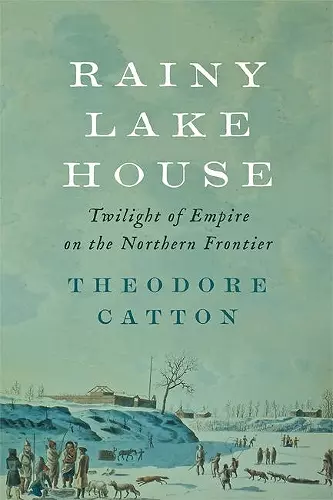Rainy Lake House
Twilight of Empire on the Northern Frontier
Format:Hardback
Publisher:Johns Hopkins University Press
Published:3rd Oct '17
Currently unavailable, and unfortunately no date known when it will be back

A journey into the complicated environment of the North American interior in the early decades of the nineteenth century. Written with clarity and energy, it tells its story through the remarkable device of a triple biography. -- Gregory Evans Dowd, author of Groundless: Rumors, Legends, and Hoaxes on the Early American Frontier Catton makes me think that there must be a gene for historical writing. In this marvelously crafted book, he uses a quarrel over the custody of children in the early nineteenth century to reveal the fraying of the hybrid Indian/white world of the lands neighboring the Great Lakes. This is a deeply human story of a nineteenth-century world that was in the midst of great change. A compelling, surprising, and dramatic account that reads like historical fiction. -- Richard White, author of The Middle Ground: Indians, Empires, and Republics in the Great Lakes Region, 1650-1815
Catton deftly crafts one grand narrative out of three and reveals the perilous lives of the white adventurers and their Indian families, who lived on the fringe of empire.In September 1823, three men met at Rainy Lake House, a Hudson's Bay Company trading post near the Boundary Waters. Dr. John McLoughlin, the proprietor of Rainy Lake House, was in charge of the borderlands west of Lake Superior, where he was tasked with opposing the petty traders who operated out of US territory. Major Stephen H. Long, an officer in the US Army Topographical Engineers, was on an expedition to explore the wooded borderlands west of Lake Superior and the northern prairies from the upper Mississippi to the forty-ninth parallel. John Tanner, a "white Indian" living among the Ojibwa nation, arrived in search of his missing daughters, who, Tanner believed, were at risk of being raped by the white traders holding them captive at a nearby fort. Rainy Lake House weaves together the captivating stories of these men who cast their fortunes in different ways with the western fur trade. Drawing on their combined experiences, Theodore Catton creates a vivid depiction of the beautiful and dangerous northern frontier from a collision of vantage points: American, British, and Indian; imperial, capital, and labor; explorer, trader, and hunter. At the center of this history is the deeply personal story of John Tanner's search for kinship: first among his adopted Ojibwa nation; then in the search for his white family of origin; and finally in his quest for custody of his half-Indian children. Rainy Lake House is a character-driven narrative about ambition, adventure, alienation, and revenge. Catton deftly crafts one grand narrative out of three and reveals the perilous lives of the white adventurers and their Indian families, who lived on the fringe of empire.
Catton's riveting story is exquisitely written and well-researched. A must-read for anyone interested in frontier history.
—Library Journal
Catton has produced a remarkable work of narrative nonfiction. ‘Rainy Lake House’ deserves a place on any history buff’s bookshelf alongside other excellent examples of frontier history narratives, including 'Undaunted Courage' (Stephen E. Ambrose), 'Astoria' (Peter Stark), 'Boone' (Robert Morgan) and 'Blood and Thunder' (Hampton Sides).
—The Missoulian
. . . well written . . . Recommended
—Choice
It is refreshing to come across a historical monograph written with such a clear commitment to the craft of storytelling... a narrative that transcends mere biography to reveal the complex and fractured world of the northern borderland during the turbulent years of the fur trade monopolies and U.S. expansion... this is a well-researched piece of scholarship that is also a true pleasure to read. Catton's aim here is not to argue small points of historiographic debate, but to offer a glimpse at the tumultuous nature of the fur trade "from its various colliding vantage points" through the compelling accounts of three individuals (p. 7). In this, he succeeds masterfully.
—John William Nelson, University of Notre Dame, Western Historical Quarterly
Catton's nuanced consideration of the cultural history of these events is enlightening.
—Thomas S. Abler, University of Waterloo, Journal of American History
This narrative focuses on three men from vastly different backgrounds and serves as a vehicle for exploring the rigors of the fur trade and the impending decline of Britain's fur-trading empire . . . Catton's writing style is lyrical and transcendent.
—Susan Sleeper-Smith, Michigan State University, American Historical Review
Thick description of the fascinating world of the Great Lakes and northern plains is the great strength of this book . . . Catton's tight focus on three protagonists lets him vividly illustrate the dynamics of fur trade society, the reorganization of the trade, and the rise of Anglo-American racism.
—Benjamin H. Johnson, Loyola University Chicago, Montana: the Magazine of Western History
ISBN: 9781421422923
Dimensions: 229mm x 152mm x 32mm
Weight: 703g
424 pages